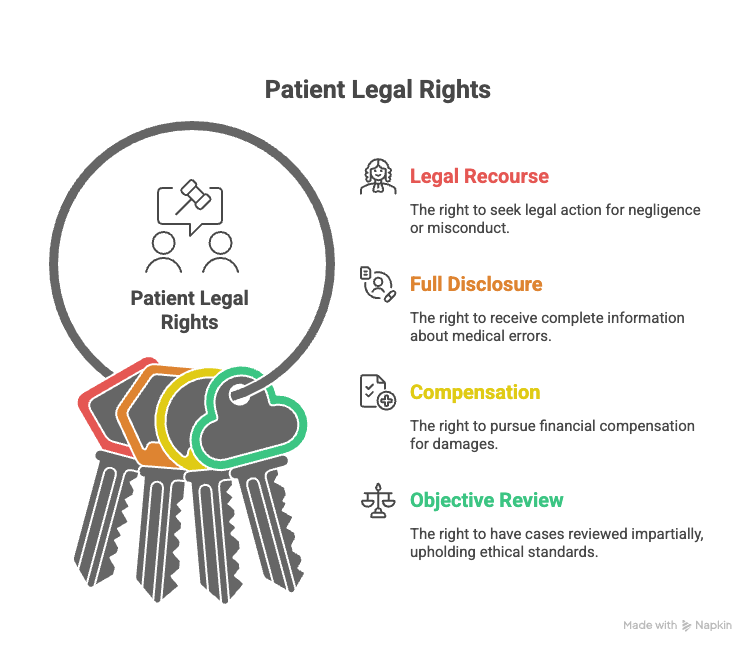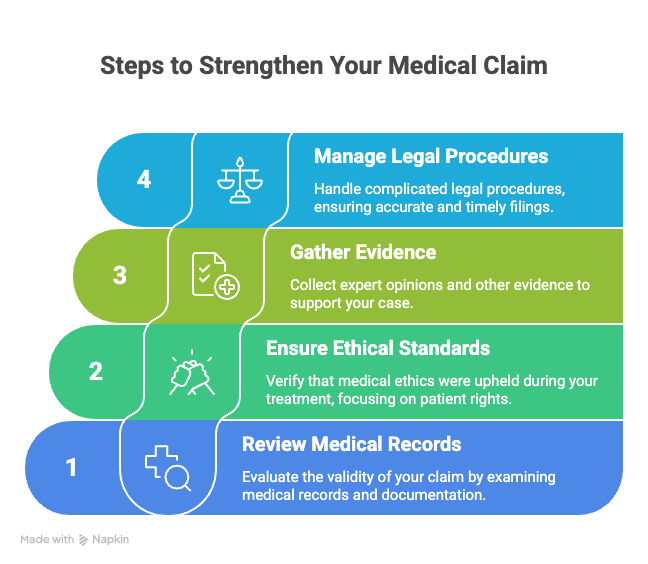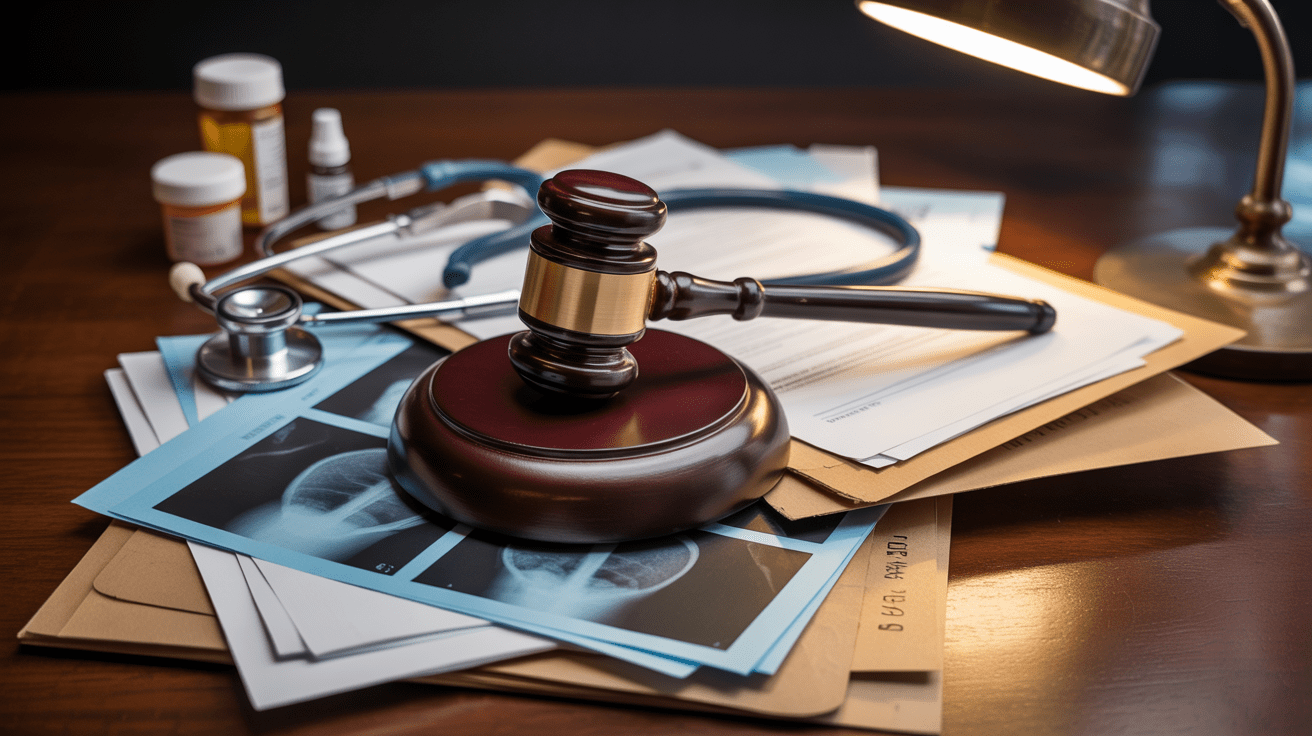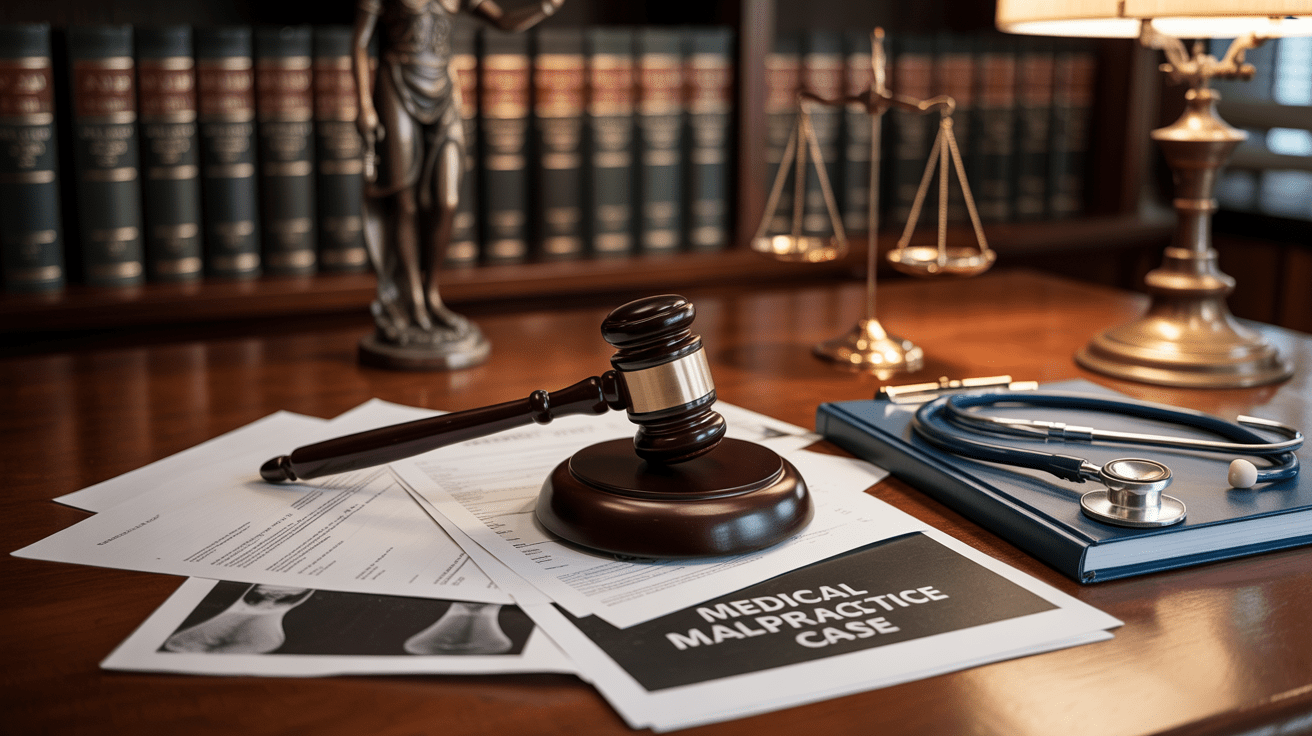A medical malpractice injury lawyer focuses on evaluating and pursuing claims when healthcare providers’ negligence causes harm.
They review medical records, gather evidence, consult experts, and guarantee all legal procedures and deadlines are met.
Their goal is to secure rightful compensation for damages like medical expenses, pain, and suffering, while upholding ethical standards.
Engaging an experienced attorney can considerably impact your case’s success; to learn more about how these professionals can assist, explore further details below.
Key Takeaways
- An experienced medical malpractice injury lawyer evaluates claims, gathers evidence, and advocates for fair compensation and patient rights.
- They review medical records, consult experts, and ensure adherence to legal deadlines and procedural requirements.
- A qualified lawyer understands medical ethics, standard care, and the causation of injuries caused by negligence.
- They help document incidents thoroughly, including details of errors and damages, to build a strong case.
- Choosing a lawyer with specialized knowledge increases the likelihood of holding providers accountable and obtaining justice.
Areas of Expertise for Medical Malpractice
- Neonatal Medical Malpractice Injury Lawyer
- Birth Injury Lawyer
- Filing a Birth Injury Lawsuit
- Oxygen Deprivation Injury Lawyer
- Brain Injury Lawyer
- Neurological Injury Lawyer
- Cerebral Palsy Injury Lawyer
- Periventricular Leukomalacia (PVL) Birth Injury Lawyer
- Neonatal Stroke Injury Lawyer
- Ischemic Stroke Injury Lawyer
- Hemorrhagic Stroke Injury Lawyer
- Intraventricular Hemorrhage Injury Lawyer
- Seizure Disorders Injury Lawyer
- Neonatal Seizures Injury Lawyer
- Failure to Diagnose Aneurysm Injury Lawyer
- Failure to Diagnose Stroke Injury Lawyer
- Physical Trauma Injury Lawyer
- Blood Disorders Injury Lawyer
- Jaundice Disorders Injury Lawyer
- Kernicterus Hyperbilirubinemia Injury Lawyer
- Severe Hyperbilirubinemia Injury Lawyer
- Failure to Diagnose Jaundice Malpractice Injury Lawyer
- Acute Bilirubin Encephalopathy Injury Lawyer
- Bilirubin-Induced Neurological Dysfunction Injury Lawyer
- Hemolytic Disease of the Newborn Injury Lawyer
- ABO Incompatibility Injury Lawyer
- Rh Isoimmunization Injury Lawyer
- Pathological Jaundice Injury Lawyer
- Breastfeeding Failure Jaundice Injury Lawyer
- Relevant Blog Posts
How We Can Help With Your Medical Malpractice Injury Claims
When you choose to retain our legal services, you gain a dedicated team committed to thoroughly investigating your medical malpractice injury claim and securing the compensation you’re rightfully entitled to.
We prioritize upholding medical ethics and respecting patient rights throughout every step of the process. Our experienced team understands the importance of holding healthcare providers accountable when their actions violate fundamental principles of patient care and safety.
We protect patient rights and uphold medical ethics by holding healthcare providers accountable for safety violations.
We diligently review medical records, interview witnesses, and consult with medical experts to establish clear evidence of negligence.
Our goal is to ensure that your rights as a patient are protected and justice is served. We believe that defending patient rights aligns with the highest standards of medical ethics, and we’re committed to serving you with integrity, professionalism, and compassion.
We’d like you to trust us to navigate the legal intricacies, so you can focus on healing and moving forward with confidence.
Understanding Medical Malpractice Injury Cases
Understanding the nature of a medical malpractice injury case requires a clear grasp of how negligence by healthcare providers can result in harm to patients. Central to this is the principle of medical ethics, which emphasizes the importance of prioritizing patient safety and maintaining a high standard of care.
When a healthcare professional fails to meet these ethical obligations—whether through misdiagnosis, improper treatment, or failure to follow established protocols—patients can suffer significant injuries.
To establish a valid claim, it’s necessary to prove that the healthcare provider‘s negligence directly caused the harm and that there was a breach of the expected standard of care.
Recognizing these aspects helps you serve others by advocating for accountability and ensuring that patient safety remains a top priority.
An understanding of these foundational elements is vital for effectively steering through a medical malpractice injury case, emphasizing the importance of maintaining trust and integrity within healthcare.
Common Causes of Medical Malpractice Injuries
Understanding the common causes of medical malpractice injuries is crucial for recognizing potential risks within healthcare settings.
These issues often include surgical errors, diagnostic oversights or delays, medication and prescription mistakes, and failures to obtain informed consent.
Identifying these hazards can help you better understand how injuries occur and highlight the importance of accountability and proper medical procedures.
Surgical Errors and Mistakes
Surgical errors and mistakes remain among the most common causes of medical malpractice injuries, often resulting from preventable lapses in judgment, communication, or procedural adherence. These errors can stem from faulty surgical techniques, inadequate sterile procedures, or miscommunication among medical staff.
Additionally, an improper focus on postoperative care may lead to complications such such as infections, bleeding, or organ damage. When healthcare providers neglect to follow established protocols or fail to monitor patients closely, the risks increase considerably.
Serving others through proper surgical practices requires meticulous attention to detail at every step, from preoperative planning to postoperative management. Minimizing these errors not only protects patients but also preserves the integrity of medical professionals committed to delivering safe, quality care.
Diagnostic Oversights or Delays
Have you ever considered how delays or oversights in diagnoses can lead to serious medical malpractice injuries?
Late diagnosis and delayed treatment often result from a failure to recognize symptoms promptly or to order appropriate tests in time. These oversights can worsen a patient’s condition, causing additional harm or even permanent disability.
When healthcare providers overlook vital signs or postpone necessary interventions, they breach their duty of care, potentially leading to legal liability.
Your role in serving others involves advocating for patients affected by such errors, ensuring they receive justice and compensation.
Addressing diagnostic delays requires careful examination of medical records and understanding how timely intervention could have altered outcomes.
Recognizing these common causes of malpractice underscores the importance of vigilance in providing accurate and prompt diagnosis.
Medication and Prescription Errors
Medication and prescription errors stand as a significant and preventable source of medical malpractice injuries. These errors often stem from lapses in medication safety and inadequate prescription management, risking patient harm.
When healthcare providers mislabel medications, prescribe the wrong dosage, or overlook allergies, they compromise patient trust and safety. Proper prescription management involves meticulous attention to detail, clear communication, and thorough review processes to prevent potentially life-threatening mistakes.
Ensuring accuracy in medication and prescription practices not only protects patients from avoidable harm but also upholds the integrity of medical professionals. Serving others through diligent medication safety and responsible prescription management is vital in reducing avoidable injuries and maintaining high standards of care.
Failure to Obtain Informed Consent
Failure to obtain informed consent remains a common cause of medical malpractice injuries, as it undermines the patient’s autonomy and right to make decisions about their healthcare.
Respecting patient autonomy requires clear, thorough consent procedures, ensuring individuals understand the risks, benefits, and alternatives of proposed treatments.
When healthcare providers neglect this duty, patients may undergo procedures without fully aware of potential consequences, leading to mistrust and avoidable harm.
Proper consent procedures protect both the patient and provider by establishing an informed, voluntary agreement.
Serving others through diligent adherence to these practices not only prevents injuries, but also upholds the ethical obligation to provide respectful, patient-centered care.
Addressing failure in this area is vital in reducing medical malpractice claims and fostering trust in healthcare relationships.
Legal Rights of Medical Malpractice Injury Victims
Understanding your legal rights as a victim of medical malpractice is essential to navigating the complex process of pursuing compensation.
Knowing your legal rights is crucial when pursuing justice in medical malpractice cases.
As someone dedicated to serving others, you should recognize that your rights include protection under medical ethics and the principles of patient advocacy. These rights guarantee your voice is heard and your well-being prioritized.
Key legal rights include:
- The right to seek legal recourse for negligence or misconduct.
- The right to obtain full disclosure regarding medical errors affecting your care.
- The right to pursue compensation for damages, including medical expenses and pain and suffering.
- The right to have your case reviewed objectively, respecting healthcare professionals’ obligations to uphold ethical standards.

Awareness of these rights enables you to act with confidence and integrity, ensuring that justice aligns with the core values of medical ethics and patient advocacy.
Your focus should remain on protecting vulnerable patients and upholding accountability within the healthcare system.
Steps to Take After a Medical Malpractice Injury
After experiencing a potential medical malpractice injury, it’s vital to take immediate steps to protect your rights and well-being.
You should seek prompt medical attention to document your condition and gather necessary evidence, while avoiding delays that could compromise your case.
Additionally, contacting an experienced malpractice lawyer early ensures you receive proper guidance and support throughout the process.
Seek Immediate Medical Attention
Why is it indispensable to seek immediate medical attention following a suspected medical malpractice injury?
Prompt evaluation ensures your injuries are properly diagnosed and treated, which is crucial both for your health and for preserving key evidence.
Delaying care may worsen your condition and complicate any future legal claims.
During this process, healthcare professionals can assess the impact of potential errors, including adverse reactions to dietary supplements that might’ve contributed to your injury.
Acting swiftly also upholds medical ethics by prioritizing your well-being, enabling healthcare providers to document your condition accurately.
This documentation will be pivotal if you pursue legal action, helping to establish the extent of harm caused by malpractice and ensuring justice is served for your injuries.
Document Incident Details
Once medical attention is underway, systematically documenting the details of the incident becomes a vital step in safeguarding your legal rights. Maintaining accurate records aligns with medical ethics and emphasizes respect for patient rights, ensuring your experience is clearly understood and preserved.
Record dates, times, locations, and the names of medical personnel involved, along with a detailed description of the events. Include any symptoms you experienced, treatments provided, and the response from healthcare providers.
If possible, gather copies of relevant medical records, test results, and correspondence.
Precise documentation helps establish the timeline and facts necessary for a potential claim. By carefully recording these details, you serve your interests while upholding the ethical standards that prioritize transparency, accountability, and the protection of patient rights.
Contact a Malpractice Lawyer
Contacting a malpractice lawyer promptly is an essential step to safeguard your legal rights and guarantee that your case is managed properly. By doing so, you uphold the principles of medical ethics and promote patient advocacy, ensuring your concerns are heard and your rights are protected.
An experienced lawyer can help you gather critical evidence, assess the validity of your claim, and guide you through intricate legal processes.
Taking immediate action shows your commitment to transparency and accountability, which are fundamental to improving healthcare standards.
Your proactive approach emphasizes the importance of addressing medical errors responsibly, not only for your well-being but also to serve others by encouraging safer, more ethical medical practices.
Ultimately, seeking legal counsel aligns with your desire to support ethical standards in healthcare.
How a Medical Malpractice Injury Lawyer Can Help You
A medical malpractice injury lawyer plays a vital role in guiding you through the detailed legal process following a healthcare-related injury. They help guarantee your rights are protected while emphasizing the importance of medical ethics and thorough patient documentation.
Your lawyer can assist in identifying breaches of proper care, such as neglecting established standards or failing to obtain informed consent.
Key ways a lawyer can help include:
- Evaluating the validity of your claim by reviewing medical records and documentation.
- Ensuring that medical ethics were upheld throughout your treatment, emphasizing patient rights.
- Gathering evidence, including expert opinions, to support your case.
- Managing complicated legal procedures, ensuring all filings and deadlines are met accurately and timely.

Long Term Effects of Medical Malpractice Injuries
Long-term medical malpractice injuries can lead to persistent health problems that affect your daily life and overall well-being. These injuries often cause emotional trauma, which can impair your mental health and personal relationships over time.
Additionally, the ongoing medical needs and lost income create a significant financial burden that can endure for years.
Chronic Health Problems
Medical malpractice injuries can lead to enduring health issues that persist long after the initial incident. These chronic health problems often include symptoms like chronic fatigue, which can severely diminish your ability to perform daily activities and participate fully in life.
Additionally, long-term pain becomes a persistent burden, impacting mobility, comfort, and overall well-being.
As someone committed to serving others, understanding the lasting effects of such injuries allows you to better advocate for those affected. Recognizing these persistent conditions emphasizes the importance of pursuing proper legal action to guarantee victims receive appropriate compensation and support.
Addressing chronic health problems requires a focused, compassionate approach, demonstrating your dedication to protecting individuals from ongoing suffering caused by medical malpractice.
Emotional Trauma Impact
Experiencing emotional trauma from medical malpractice injuries can have profound and enduring effects on your mental health and overall well-being. Such trauma may lead to feelings of anxiety, depression, or post-traumatic stress, which can persist long after physical injuries heal.
Building emotional resilience becomes crucial in managing these lasting impacts. Seeking trauma counseling can provide the necessary support to process these difficult emotions effectively, fostering healing and recovery.
As someone dedicated to serving others, understanding the significance of addressing emotional trauma is indispensable; it ensures you offer comprehensive compassion that considers both physical and psychological needs.
Recognizing and addressing these effects not only improves your overall recovery but also reinforces your strength in overcoming the long-term consequences of medical malpractice injuries.
Financial Burden Rise
As the financial repercussions of medical malpractice injuries extend well beyond immediate medical expenses, many individuals face a significant rise in long-term financial burdens. The ongoing costs of rehabilitation, therapy, and adaptive devices, combined with lost income, can lead to substantial economic hardship. This financial strain threatens your ability to provide for your family and fulfill your responsibilities to others. To illustrate this impact:
| Aspect | Impact | Emotional Toll |
|---|---|---|
| Medical bills | Persistent and escalating expenses | Anxiety over unmanageable debt |
| Lost income | Reduced earning capacity | Fear of financial instability |
| Rehabilitation | Ongoing therapy and support needs | Frustration and helplessness |
| Adaptive devices | Continuous purchases for mobility or care | Dependency and concern for future |
| Family support | Increased burden on loved ones | Guilt and worry |
Proving Liability in Medical Malpractice Medical Malpractice Injury Cases
Establishing liability in medical malpractice injury cases requires a thorough demonstration that the healthcare provider breached the accepted standard of care, directly resulting in the patient’s harm.
To do this, you must prove that medical negligence or healthcare errors occurred during treatment. This involves showing that the provider’s actions deviated from what a reasonable professional would do under similar circumstances.
You’ll need expert testimony to establish what the accepted standard of practice is and how it was violated. It’s critical to connect these breaches directly to the injury suffered, demonstrating causation clearly.
Your goal is to serve others by ensuring accountability for preventable harm caused by substandard care.
This process requires careful collection and presentation of evidence, including medical records and expert opinions, to build a compelling case.
Ultimately, proving liability hinges on establishing that a healthcare provider’s actions fell below established standards, leading to avoidable injury.
Compensation for Medical Malpractice Damages
Understanding the scope of compensation available in medical malpractice cases is vital for ensuring that victims receive adequate restitution for their injuries.
Compensation may cover a variety of damages, including medical expenses, lost wages, and pain and suffering.
It’s imperative to recognize that medical ethics and patient consent play a significant role in determining liability and damages.
When healthcare providers violate principles of medical ethics or fail to obtain proper patient consent, the resulting harm can be substantial, warranting appropriate compensation.
Ensuring that the injured party is compensated fairly aligns with the moral obligation to serve others and uphold the integrity of medical practice.
By pursuing such claims, you help bring justice to those harmed by negligence, reinforcing the importance of accountability in healthcare.
Proper compensation not only aids in recovery but also underscores the importance of ethical standards in medical treatment.
The Statute of Limitations for Medical Malpractice Injury Cases
The time limit for initiating a medical malpractice claim, known as the statute of limitations, considerably impacts your ability to seek legal recourse. This deadline varies by jurisdiction but generally ranges from one to three years from the date of injury or discovery of harm.
Understanding this timeframe is vital because, once it expires, your opportunity to pursue justice is forfeited, regardless of the case’s value. In medical settings, adhering to medical ethics means prioritizing patient confidentiality and timely communication, which can influence the statute of limitations.
If you believe your rights have been violated due to medical negligence, acting promptly ensures protection of your legal interests. Recognizing the crucial nature of deadlines helps you serve others by seeking accountability and promoting high standards of care.
Consulting a knowledgeable attorney guarantees you steer through these intricate legal timelines accurately, safeguarding both your rights and the integrity of the healthcare system.
Why You Need an Experienced Medical Malpractice Injury Lawyer
Having an experienced medical malpractice injury lawyer with you can greatly influence the outcome of your case, especially when holding healthcare providers accountable. An attorney knowledgeable in medical ethics understands the importance of protecting patient rights and promoting fairness in the healthcare system.
They help guarantee that doctors are held responsible for negligence or misconduct, which is vital for maintaining professional accountability. Such lawyers possess a deep understanding of the intricacies involved in medical malpractice cases, enabling them to gather compelling evidence and steer legal procedures efficiently.
Their expertise allows them to advocate effectively on your behalf, emphasizing the significance of transparency and ethical standards in medicine.
How to Choose the Right Medical Malpractice Injury Lawyer for Your Case
Choosing the right medical malpractice injury lawyer is a vital step that requires careful consideration of their experience, specialization, and track record.
It’s necessary to select someone who demonstrates a strong commitment to medical ethics, prioritizing patient safety above all.
An attorney with a background in healthcare-related cases will better understand the intricacies involved and can steer the legal process effectively.
Look for a lawyer who’s a history of successfully handling similar cases and who shows genuine concern for serving others by advocating for victims’ rights.
A dedicated professional will listen carefully to your concerns, maintain transparency, and uphold ethical standards throughout the process.
Ultimately, your choice should reflect a focus on justice and a commitment to improving patient safety, ensuring your case is handled with the utmost integrity.
This approach not only provides the best possible legal support but also aligns with the core values of serving and protecting others.
About the Law Offices of Anidjar and Levine
When pursuing justice in a medical malpractice injury case, it’s crucial to work with attorneys who combine legal proficiency with a deep understanding of the healthcare system.
The Law Offices of Anidjar and Levine are committed to upholding medical ethics and safeguarding patient rights. Their experienced team recognizes that trust and integrity are vital when advocating for those wronged by medical negligence.
With a focus on compassion and professionalism, they prioritize serving clients’ best interests while ensuring accountability.
They understand the subtleties involved in medical malpractice claims and work diligently to handle these intricacies effectively.
By emphasizing ethics and patient-centered care, they aim to restore justice and promote safer healthcare practices.
Choosing the Law Offices of Anidjar and Levine means partnering with attorneys who are dedicated to your case and determined to uphold the highest standards of legal and medical integrity.

Frequently Asked Questions
How Do I Find the Best Medical Malpractice Injury Lawyer for My Case?
To find the best medical malpractice injury lawyer for your case, focus on their experience with similar claims and their familiarity with utilizing expert witnesses, which can strengthen your case.
Consider their transparency regarding legal fees and assess their track record of successful outcomes.
Schedule consultations to evaluate their communication skills and dedication to serving clients.
An expert attorney will prioritize clarity, professionalism, and your best interests to guarantee fair representation.
What Is the Typical Timeline for a Medical Malpractice Injury Lawsuit?
The typical timeline for a medical malpractice injury lawsuit varies depending on case intricacy and legal procedures involved.
Generally, it can take anywhere from one to several years to resolve, with initial investigation, filing, discovery, and trial phases contributing to the duration.
It’s essential to understand that delays often result from gathering evidence related to medical negligence and ensuring thorough preparation, ultimately aiming to secure just compensation for those harmed due to medical errors.
Are Medical Malpractice Damages Taxable?
Medical malpractice damages are generally taxable if they compensate for lost wages or punitive damages, which are considered income.
However, damages for medical bills, pain, and suffering may be tax-exempt, especially if settlement funds come from malpractice insurance or are designated as compensatory.
It’s crucial to consult a tax professional to understand how your specific case, including medical billing and malpractice insurance payouts, affects your tax obligations, ensuring you serve others sincerely and knowledgeably.
Can I Settle a Medical Malpractice Claim Without Going to Court?
Yes, you can settle a medical malpractice claim without going to court through a legal settlement process. This approach often involves negotiation between you, the healthcare provider, and their insurance company.
The goal is to resolve medical negligence claims efficiently. A settlement allows you to receive compensation without the stress and expenses of litigation.
However, it’s crucial to make sure the settlement fully addresses your damages and rights before finalizing the agreement.
What Evidence Is Most Important in Proving Medical Malpractice?
The most vital evidence in proving medical malpractice includes documentation of informed consent, which demonstrates the patient’s awareness of treatment risks.
It also includes expert testimony, which clarifies whether the standard of care was breached.
You should guarantee detailed medical records, witness statements, and clear documentation of any communication, as these elements collectively establish the provider’s negligence.
This extensive evidence builds a compelling case to serve patients’ rights and uphold justice effectively.
————
If you’ve suffered a medical malpractice injury, understanding your legal rights and acting promptly are crucial. An experienced attorney can guide you through the intricate process of filing a claim, ensuring your case is handled with the utmost professionalism and precision.
By choosing the right lawyer and adhering to the applicable statutes of limitations, you enhance your chances of receiving rightful compensation.
Trust the knowledge of the Law Offices of Anidjar and Levine to advocate for your best interests effectively.

